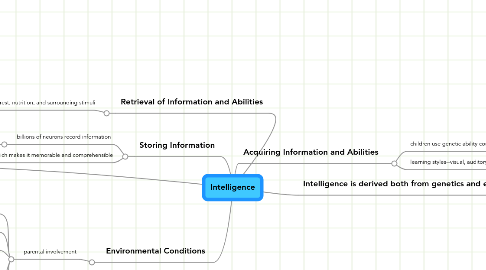
1. Genetics
1.1. heredity
1.1.1. twin and adoption studies show hereditary factor
1.1.2. Intelligence can change so the abilities that a child is born with is not the end all. Studies have shown that a child that scores poorly when little, can score above average on an IQ test as he or she gets older.
1.2. gender differences
2. Environmental Conditions
2.1. parental involvement
2.1.1. brain stimulation
2.1.1.1. reading, talking, teaching, explaining, creating
2.1.2. nutrition
2.1.2.1. Insufficient nutrition can stunt a child's brain development.
2.1.3. school placed into
2.1.3.1. Teachers can perpetuate low IQ in lower socioeconomic classrooms by lowering their expectations for their students.
2.1.4. physical and emotional trauma vs. stability
2.1.4.1. abuse and neglect can negatively affect a child's intellectual development
2.1.4.2. love and stability fosters regular and even advanced intellectual development
2.1.5. early intervention in a unstable home environment can undo some damage
3. Storing Information
3.1. billions of neurons record information
3.1.1. everything is recorded but the problem lies in retrieving the information
3.2. neurons are linked together into neural systems--this helps link information together, which makes it memorable and comprehensible
4. Retrieval of Information and Abilities
4.1. retrieval of information depends on attention level, rest, nutrition, and surrounding stimuli
5. Intelligence is derived both from genetics and environmental conditions and is the acquiring, storing, and retrieval of both concrete and abstract information and abilities.
5.1. Critiques of Intelligence
5.1.1. In the past, some researchers have thought that intelligence was either determined mostly by heredity or mostly by environmental factors. I believe, along with more current lines of thought, that both play a fairly equal balance in the intelligence outcome of a child.
